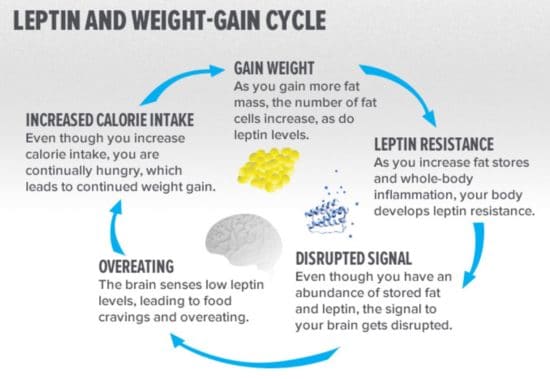Leptin is a hormone produced primarily by fat tissue. It plays an important role in weight regulation.
In recent years, leptin supplements have become quite popular. They claim to decrease appetite and make it easier for you to lose weight, BUT not all created equal.
This article reviews what leptin is, how it works and if supplements can help you lose weight or if what you experience is leptin resistance.
Leptin is a hormone produced by fat cells, interfering with thyroid hormone production and metabolism, the bodies ability to burn fat and control hunger.
During periods of food shortage or starvation, leptin levels decrease.
Low leptin levels can lead to weight gain whereas high leptin levels leads to weight loss. YES! the opposite of what you thought I bet! ……keep reading to find out about Leptin resistance!
And guess what ladies? Women are 3X less responsive to leptin than men. GO FIGURE! Leptin resistance has a lot to do with women and childbearing and our bodies desire
to ignore it at times when we are storing extra fat for baby.
The hormone was discovered in 1994 and has been studied ever since for its function in weight regulation and obesity in both animals and humans.
Leptin communicates to the brain that you have enough stored fat, which curbs your appetite, signals the body to burn calories normally and prevents excessive eating.
Conversely, when levels are low, your brain senses starvation, your appetite increases, your brain signals you to take in more food and you burn calories at a slower rate.
This is why it’s often referred to as the starvation or hunger hormone.
So to sum up so far so your not confused before we go on….. Leptin is a hormone released by fat cells. It helps regulate how many calories you burn and how much you eat, which in turn regulates how much fat tissue your body stores.If plenty of leptin and fat tissue are available, leptin tells the brain that your body has enough energy stored and you can stop eating.
Now here’s the Leptin resistance part. In obesity, it’s not so black and white.
People who are obese are shown to have much higher levels of this hormone than individuals of average weight.
It would seem that higher levels would be favorable, as there would be plenty available to communicate to your brain that your body is full and cease eating.
Yet, this isn’t the case though. Leptin resistance occurs when your brain stops acknowledging the hormone’s signal.
This means that even though you have more than enough of the hormone available and energy stored, your brain does not recognize it and thinks you’re still hungry. As a result, you continue to eat.
Leptin resistance not only contributes to eating more but also signals your brain that you need to save energy, which leads you to burn calories at a slower rate.
In terms of weight loss, more leptin is not necessarily what matters. How well your brain interprets its signal is much more significant.
Therefore, taking a supplement that increases blood leptin levels does not necessarily lead to weight loss.
Leptin resistance occurs when there’s plenty of the hormone available but its signal is impaired. Therefore, increased leptin levels are not what’s important for weight loss, but improving leptin resistance may help.
While numerous supplements are labeled as “leptin pills,” most contain a mix of various nutrients marketed to reduce inflammation and, therefore, increase leptin sensitivity.
Some feature ingredients like alpha-lipoic acid and fish oil, while others contain green tea extract, soluble fiber or conjugated linoleic acid. Such products as Skinny Elite with T3 thyrodiidonine,Green tea, caffeine, Yohimbine and a few others and Skinny Bee Gold with lipotropic B12 vitamins,LCTC. Schizandra Berry, Inositol, and more, are perfect examples of what women need to boost their metabolism and lose weight.
Correcting or preventing resistance is an important step in supporting weight loss.
Here are some suggestions that may help improve leptin resistance, increase sensitivity and encourage weight loss without having to take a supplement:
- Increase your physical activity: Research in both animals and humans indicates that engaging in regular physical activity may increase leptin sensitivity.
- Decrease intake of high-sugar foods and beverages: Diets rich in excessive sugar may worsen leptin resistance. Studies show that resistance improved in rats on a sugar-free diet .
- Eat more fish: Studies suggest that diets rich in anti-inflammatory foods like fish may reduce blood levels of the hormone, improve sensitivity and promote weight loss.
- High-fiber cereals: One study suggests that eating high-fiber cereals, particularly oat fiber, may improve resistance and sensitivity and aid weight loss .
- Get a good night’s rest: Sleep is key to hormone regulation. Chronic lack of sleep has been associated with altered leptin levels and function .
- Reduce your blood triglycerides: Having high triglycerides is said to inhibit the leptin transporter involved in carrying the signal to stop eating through the blood to the brain.
- Avoid highly processed and deep fried foods
- Purchase non GMO products=not genetically modified
- Skip the freezer meals, commercial dairy section, and the middle aisles of the grocery store
- YOUR BODY NEEDS REAL WHOLE FOOD, AND I MEAN CHICKEN FISH, EGGS, TURKEY, VEGETABLES, FRUIT IN THE REAL FORM
Consuming a well-balanced diet, completing moderate physical activity and getting enough sleep is the best way to improve leptin resistance and encourage weight loss.
Summary: Increasing physical activity, getting enough sleep, decreasing sugar intake and including more fish in your diet are some steps you can take to improve leptin sensitivity. Lowering your blood triglycerides is important, too.
Leptin is a hormone generated by fat cells. It signals your brain to tell your body when you’re full and should stop eating. This is also why the Keto diet or extremely low carb would work with adding higher healthy fats.
STOP BACK TO LEARN MORE OR CHECK OUT THE PRODUCTS TODAY!

